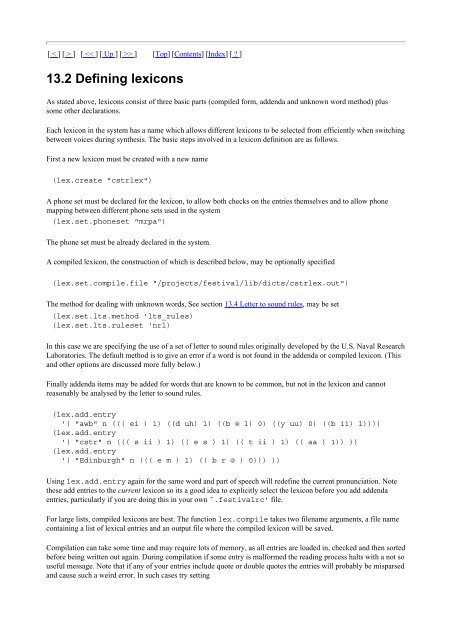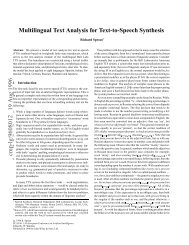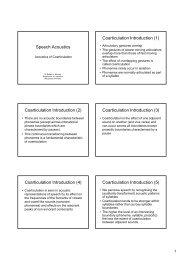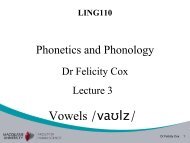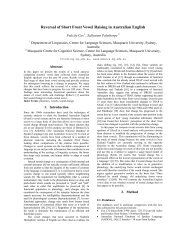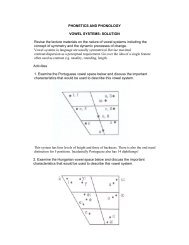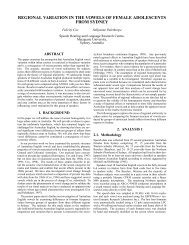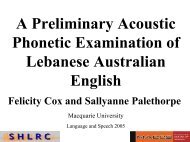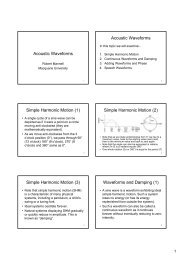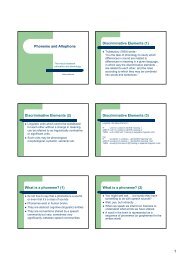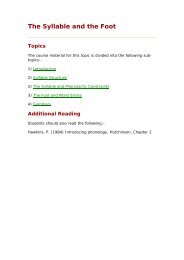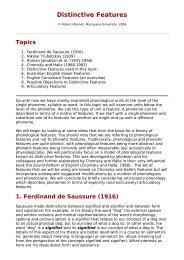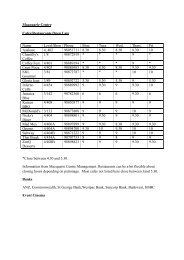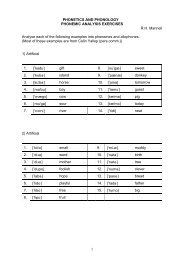Festival Speech Synthesis System: - Speech Resource Pages
Festival Speech Synthesis System: - Speech Resource Pages
Festival Speech Synthesis System: - Speech Resource Pages
Create successful ePaper yourself
Turn your PDF publications into a flip-book with our unique Google optimized e-Paper software.
[ < ] [ > ] [ > ] [Top] [Contents] [Index] [ ? ]<br />
13.2 Defining lexicons<br />
As stated above, lexicons consist of three basic parts (compiled form, addenda and unknown word method) plus<br />
some other declarations.<br />
Each lexicon in the system has a name which allows different lexicons to be selected from efficiently when switching<br />
between voices during synthesis. The basic steps involved in a lexicon definition are as follows.<br />
First a new lexicon must be created with a new name<br />
(lex.create "cstrlex")<br />
A phone set must be declared for the lexicon, to allow both checks on the entries themselves and to allow phone<br />
mapping between different phone sets used in the system<br />
(lex.set.phoneset "mrpa")<br />
The phone set must be already declared in the system.<br />
A compiled lexicon, the construction of which is described below, may be optionally specified<br />
(lex.set.compile.file "/projects/festival/lib/dicts/cstrlex.out")<br />
The method for dealing with unknown words, See section 13.4 Letter to sound rules, may be set<br />
(lex.set.lts.method 'lts_rules)<br />
(lex.set.lts.ruleset 'nrl)<br />
In this case we are specifying the use of a set of letter to sound rules originally developed by the U.S. Naval Research<br />
Laboratories. The default method is to give an error if a word is not found in the addenda or compiled lexicon. (This<br />
and other options are discussed more fully below.)<br />
Finally addenda items may be added for words that are known to be common, but not in the lexicon and cannot<br />
reasonably be analysed by the letter to sound rules.<br />
(lex.add.entry<br />
'( "awb" n ((( ei ) 1) ((d uh) 1) ((b @ l) 0) ((y uu) 0) ((b ii) 1))))<br />
(lex.add.entry<br />
'( "cstr" n ((( s ii ) 1) (( e s ) 1) (( t ii ) 1) (( aa ) 1)) ))<br />
(lex.add.entry<br />
'( "Edinburgh" n ((( e m ) 1) (( b r @ ) 0))) ))<br />
Using lex.add.entry again for the same word and part of speech will redefine the current pronunciation. Note<br />
these add entries to the current lexicon so its a good idea to explicitly select the lexicon before you add addenda<br />
entries, particularly if you are doing this in your own `.festivalrc' file.<br />
For large lists, compiled lexicons are best. The function lex.compile takes two filename arguments, a file name<br />
containing a list of lexical entries and an output file where the compiled lexicon will be saved.<br />
Compilation can take some time and may require lots of memory, as all entries are loaded in, checked and then sorted<br />
before being written out again. During compilation if some entry is malformed the reading process halts with a not so<br />
useful message. Note that if any of your entries include quote or double quotes the entries will probably be misparsed<br />
and cause such a weird error. In such cases try setting


